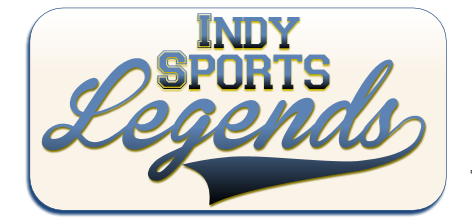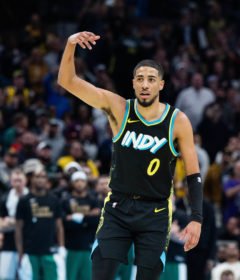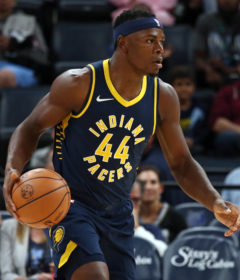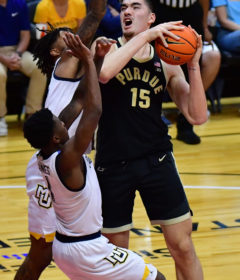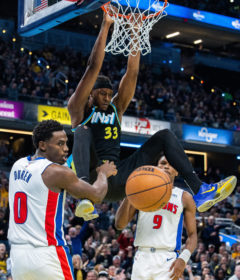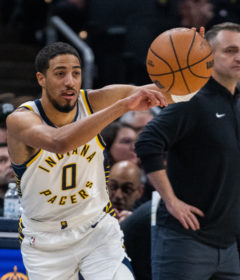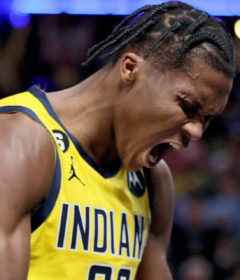Brunt: What I’ve learned since my Associated Press job was eliminated
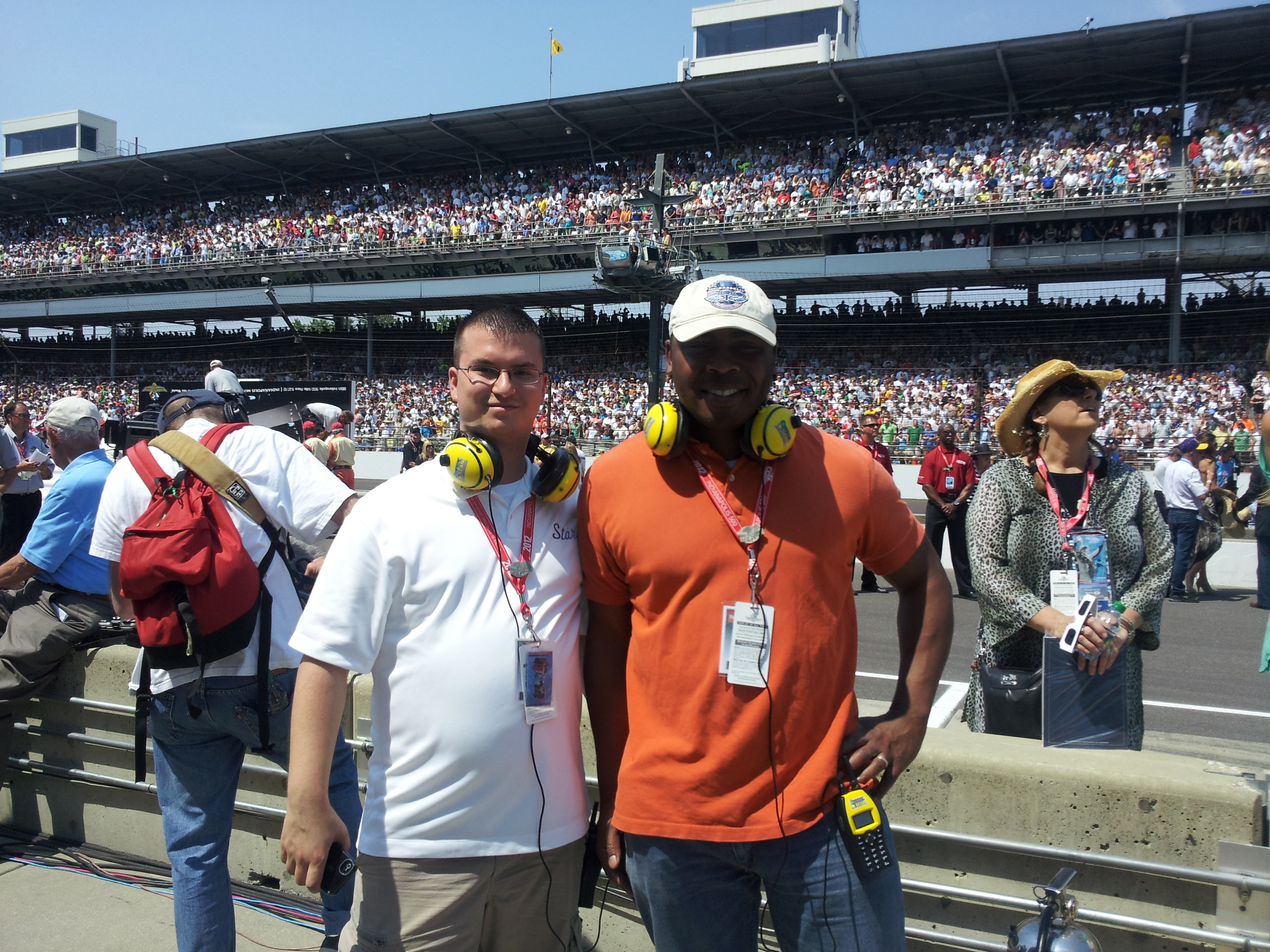
Jim Johnson and Cliff Brunt at the 2012 Indianapolis 500.
Founder’s note: After being laid off in 2012, I was re-hired by The Associated Press in Jan. 2014 as a sports writer in Oklahoma City. As a result, I’ll add an 11th thing to this list: Never burn bridges. I faithfully worked as a freelancer for The AP during the layoff and kept in touch with folks. I am blessed to be covering the Oklahoma City Thunder and Oklahoma and Oklahoma State athletics. I was even more blessed to cover the 2016 Rio Olympics. The current chapter is a good one.
By CLIFF BRUNT
ISL Founder
One year ago, I got the call.
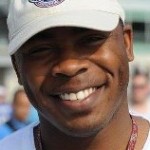
It was a call many in the journalism business have nightmares about.
It was the call from Associated Press Sports Editor Terry Taylor telling me the second sports reporter position in Indianapolis was being eliminated.
Yeah, that was my job. Worked for the company for seven years.
Calls from Taylor are rare and often aren’t good, so I felt uneasy when I realized she was on the phone. What she said was a shocker because I was coming off one of the best years of my career, something she acknowledged during the conversation and many times after that.
I had two choices — take the offered buyout or transfer to Dallas or Knoxville, Tenn. With respect for my wife’s job — she’s a professor in the Indiana University Department of Health Sciences — I chose to stick it out and stay in Indianapolis. You can’t transfer tenure, and she’s getting close. For the family’s sake, it made sense to stay and find a way to get through.
All sorts of things popped up throughout the next year. Anger. Fear. Faith. Sadness. Frustration. Reality checks. Joy. A bold new willingness to try new things. I think a better person emerged from it all.
I’m in training as a car salesman at Penske Chevrolet in Indianapolis. Never saw myself here. But here I am, ready to make the best of it. With a heart primed for adventure, here is a list of the top 10 most important things I’ve learned since April 11, 2012.
1. Job titles don’t mean much.
You can work your whole life climbing the ladder for something, but what happens when the ladder is yanked out from under you? You’re stuck solely with who you are and what you believe. Losing a job will test those things. There are too many sports writers, myself included for many years, who identify themselves far too much by what they do, who they cover, who they’ve talked to, where they’ve gone. My wife, Christina, just overcame thyroid cancer. She’s fine, but she’s going to be on medication for the rest of her life. I lost a job, that’s all. I don’t know if you believe in God, but I believe he has a way of giving perspective when you’re off track, or clarifying when you’re on track but are at risk of losing your way. No matter who you are or what you do, nothing that can be removed at someone else’s whim is worth identifying yourself by. Give your best, yes. But keep it in perspective.
2. The journalism business as we knew it is dead.
I spoke to one of the best sportswriters in the country earlier this season as I was covering a Miami Heat-Indiana Pacers game as a freelancer. He tweeted, wrote his game story and posted content on his paper’s website at the same time. It was fascinating. There was a day when a person of this stature would have had all kinds of assistants to help take care of that stuff. Not anymore. Everyone is trying to get more out of less. More than ever, it is about maximizing production while reducing costs. The result is overworked reporters producing a lesser product. Sports writers tend to be some of the most cynical people on Earth anyway. Now, they’re even worse.
An example of the change in the journalism business is the whole Manti Te’o debacle. There wasn’t nearly enough research done on that story. If anybody was willing to spend the time or money, they would have checked up on Lennay Kekua and the situation would have never gotten to the point it did. But folks don’t have the manpower or the cash to do real journalism anymore. As a person who made his mark as an enterprise reporter, it was very difficult to watch what happened in this and other situations. No matter what anybody tells me, I will always believe getting it right is more important than getting it first. If folks don’t like that, it’s their problem, not mine.
3. There are some good people in journalism.
I was starting to doubt this, too. But, just when things were at their worst, folks started coming through. Jeremiah Johnson at Fox 59 had me talk on his Sports Overtime show, giving my website credibility. Jake Query and Derek Schultz have me on their radio show on AM 1260 every Thursday at 4:35 p.m. After I started Indy Sports Legends, person after person who believed in what the site stood for came through. Chris Goff, Sam Klemet, Chuck Samples, Doug Griffiths, Ben Fahrbach, Collin O’Connor, J.W. Calinger and Paul Siegfried are all extremely talented people who contacted me and said they believed in ISL and wanted to make it something special. I didn’t recruit a single one of them. In 11 months, we’ve drawn more than 100,000 unique visitors and nearly 250,000 pageviews. It wouldn’t have happened without those people.
Beyond the site, I also must credit Jeff Reynolds at The Sports XChange for giving me a shot at covering Butler and IU basketball, the Big Ten football title game and the Indianapolis regional as a freelancer and giving me editing work. Former Indy Star prep sports editor Nat Newell gave me a lot of work while we were having a rough time (he has been promoted). Mike Marot at the AP has proven in the past few months that he believes in me more than I ever thought he did.
4. I can create a website (with a lot of help).
Never in a million years did I believe something like Indy Sports Legends could happen. I had no clue how to run a website. My neighbor, Joe Heller, floated the idea. I didn’t think it could be done. Nearly a year later, we’ve been credentialed for NCAA regionals in Indianapolis and Washington. We were credentialed for Indiana and Butler basketball and Notre Dame football. Something that seemed over my head became a reality. Sometimes, you don’t know what you can do until you don’t have much choice. Heller and Ryan Naylor get a lot of credit on this part. They walked me through a lot of steps so I didn’t look completely clueless. Thanks, guys.
5. I’m not good at selling cars.
 Not yet, at least. I got ahead of myself this week and ended up sending too many customers off in the car they came in. That’s OK. I’m still in training. Here’s the lesson for this week: When you’re learning something new, focus on the learning as much or more than the doing because you don’t know what you’re doing. It’s been nearly 20 years since I had a job that was not journalism. I’m not going to reach the level I was at as a writer in a month of training as a car salesman. That is probably the hardest part right now — not being good at what I do and being patient with the process.
Not yet, at least. I got ahead of myself this week and ended up sending too many customers off in the car they came in. That’s OK. I’m still in training. Here’s the lesson for this week: When you’re learning something new, focus on the learning as much or more than the doing because you don’t know what you’re doing. It’s been nearly 20 years since I had a job that was not journalism. I’m not going to reach the level I was at as a writer in a month of training as a car salesman. That is probably the hardest part right now — not being good at what I do and being patient with the process.
6. I’m not the only one.
Once my position was eliminated, there seemed like there were thousands of sports writers who switched to odd jobs that have nothing to do with writing but still have their feet wedged in the door. There ought to be a former sportswriters anonymous group, though I suspect that’s kind of what Indy Sports Legends has become. Anyways, the point is, changing careers feels weird, but it happens. And in a way, I kind of like the challenge. After you’re done being scared to death and ticked that your degree means absolutely nothing, embrace your new life.
7. We’re not missing meals, so I have no right to whine.
I could sit here and complain about the fact that my kids don’t get to go to Chuck E. Cheese as often as they used to, but if you’ve seen my kids, you know there’s food on the table. A lot of people can’t say that. A big part of that is that my wife has maintained her career while I have scraped and clawed my way through. Bottom line — the family is healthy, the bills are paid and I have potential. Tomorrow? As Bart Scott says, “Can’t wait.”
8. Terry Taylor is a good person.
Taylor gets a bad rap sometimes because she’s the boss. But one thing I will say about her is you always know where you stand with her. That is very important to me. I started strong at the AP, got in a rut, then bounced back. And at each stage, I knew where I stood with her. That can’t be said for everybody in the business. Some people who will remain nameless have gotten awfully far up the ladder without people skills. As someone who now manages people as editor of a website, I know more than ever how important being upfront with folks is. No matter what your title, you can’t gain the respect of others if you backstab or aren’t real. Terry Taylor told it like it is, and, though I didn’t always like what she said, I respect her for saying it.
9. My readers and the athletes like my writing, even if it’s not for the AP.
This was a key one. When I started ISL, I couldn’t believe how many loyal followers I had. My Twitter following has increased by almost 600 since I left the AP. I could have never foreseen that. And folks like Robbie Hummel, Chris Kramer, Tamika Catchings, Joe Tiller and Gene Keady return phone calls, even though I don’t work for the AP anymore. That kind of stuff is awesome. It’s nice to know your work is appreciated by the readers and the people you covered. The Purdue fans have been particularly loyal, and that will forever be appreciated. No matter what happened on April 11, 2012, ISL’s numbers and the Twitter numbers don’t lie.
10. My wife is my biggest fan.
Through all of this, Christina has believed in me more than anyone. Craig Dragash, Jim Johnson and Corey Brown have been key influences, but my wife has been the most incredible inspiration. She recently got a clean report after going through treatments for the thyroid cancer. Even as she was drained, at times working from a hospital bed, she pushed me and reminded me that I was talented and had much to offer. She is the last and most important person to thank.
I don’t know what the story will be next year, but I suspect it will be a good one. Stay tuned!
